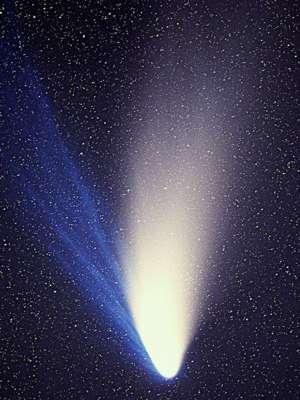 (source)
(source)
|
Alan Hale
(7 Mar 1958 - )
American astronomer and writer who co-discovered (with Thomas Bopp) the Comet Hale-Bopp (1995), the farthest comet ever to be discovered by amateurs.
|
Science Quotes by Alan Hale (7 quotes)
As soon as I looked, I saw a fuzzy object nearby. It was strange, because I’d looked at M70 a couple of weeks earlier and the object hadn’t been there.
— Alan Hale
About how he discovered the Comet Hale-Bopp. As quoted in Michael D. Lemonick, 'Comet of the Decade, Part II', Time (17 Mar 1997), 149, No. 11, 56. Further explanation in Lemonick’s own words, “A few hours later he looked again, and the object had moved. It was a comet for sure.”
It’s been kind of nerve-racking to sit through all those months wondering if the comet would fizzle.
— Alan Hale
About the year and a half wait for the most impressive performance as Comet Hale-Bopp approached closest to Earth. As quoted in Michael D. Lemonick, 'Comet of the Decade, Part II', Time (17 Mar 1997), 149, No. 11, 56.
Rampant scientific illiteracy in the general public is, in my opinion, one major cause of the current lack of opportunities for scientists. … A public that is ignorant of science, and of how science is done, is not going to support scientific research enthusiastically.
— Alan Hale
In 'Shattered Hopes and Dreams: The Dim Prospect for Careers in Science', Chronicle of Higher Education (5 Dec 1997). As cited in chapter 13 epigraph, Daniel S. Greenberg, Science, Money, and Politics: Political Triumph and Ethical Erosion (2003), 205.
Scientifically, the comet was a bonanza, due both to its impressive performance and to the long lead-time provided by its early discovery. Much of the science concerning Hale-Bopp was tied into questions of our own origins. The comet helped establish connections between material present in interstellar clouds and material delivered by comets to the early Earth.
— Alan Hale
In 'Hale-Bopp + 10', Astronomy (Jul 2005), 33, No. 7, 76-79.
Sometimes I wonder about the world that will greet Hale-Bopp on its next return in the 44th century (according to latest calculations).
— Alan Hale
In 'Hale-Bopp + 10', Astronomy (Jul 2005), 33, No. 7, 76-79.
The Earth does not orbit the sun because of any gravitational pull that the sun exerts on Earth; rather, the sun, being a rather massive object, warps the fabric of space time around it, and the Earth, in attempting to move in a straight line, is instead placed into its near-circular orbit around the sun due to this warping.
— Alan Hale
In column, 'In Our Skies: Surfing the Gravitational waves of Einstein’s theory', Ruidoso News (online 25 Feb 2016), on ruidosonews.com website.
Usually, only handfuls of dedicated amateur astronomers view such events. Billions of people saw Hale-Bopp. So, until a better comet comes along, it remains the great comet of our lives.
— Alan Hale
In 'Hale-Bopp + 10', Astronomy (Jul 2005), 33, No. 7, 76.
See also:
- 7 Mar - short biography, births, deaths and events on date of Hale's birth.
- Everybody’s Comet: A Layman’s Guide to Hale-Bopp, by Alan Hale. - book suggestion.

 In science it often happens that scientists say, 'You know that's a really good argument; my position is mistaken,' and then they would actually change their minds and you never hear that old view from them again. They really do it. It doesn't happen as often as it should, because scientists are human and change is sometimes painful. But it happens every day. I cannot recall the last time something like that happened in politics or religion.
(1987) --
In science it often happens that scientists say, 'You know that's a really good argument; my position is mistaken,' and then they would actually change their minds and you never hear that old view from them again. They really do it. It doesn't happen as often as it should, because scientists are human and change is sometimes painful. But it happens every day. I cannot recall the last time something like that happened in politics or religion.
(1987) -- 


